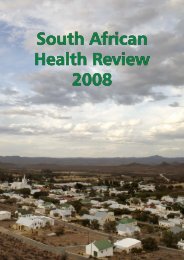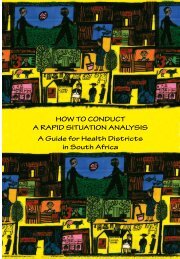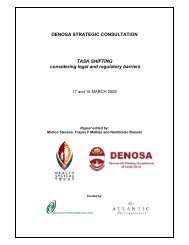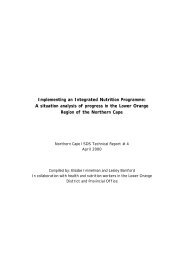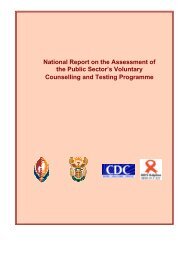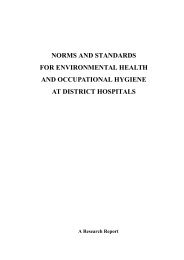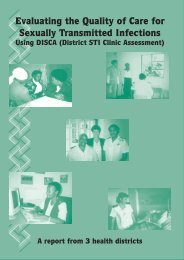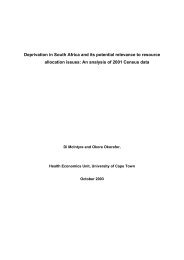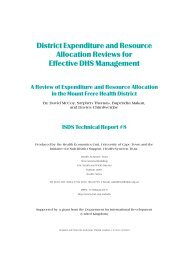SAHR 2007 - Health Systems Trust
SAHR 2007 - Health Systems Trust
SAHR 2007 - Health Systems Trust
You also want an ePaper? Increase the reach of your titles
YUMPU automatically turns print PDFs into web optimized ePapers that Google loves.
Editorial<br />
The Role of the Private Sector within<br />
the South African <strong>Health</strong> System<br />
Introduction<br />
The provision and financing of health care in South Africa<br />
occurs within two fundamentally different ‘systems’; the public<br />
health system and the private health system. This however,<br />
is an oversimplification, because within the private health<br />
system, the traditional health sector stands apart from the<br />
formal private health sector from perspectives of organisation,<br />
financing and health care delivery.<br />
The socio-economic status of an individual in South Africa<br />
is the primary determinant of the system through which he<br />
or she will receive access to health care. Given vast and<br />
growing discrepancies in resources spent between both<br />
sectors, socio-economic status is very often also a determinant<br />
of the level and quality of health care that a person<br />
is able to access. As the right of access to health care is<br />
a constitutionally protected basic human right, the resultant<br />
inequities in access to health care undermine and impede<br />
the objectives of transformation of South Africa to a more<br />
just and equitable society.<br />
Government has initiated various policy and legislative<br />
measures to improve access to health care in the public<br />
sector and to bring a measure of rationality to the expansion<br />
of the private sector. The private sector has typically<br />
vociferously backed civil society efforts to pressure government<br />
into improving equitable access to care in the public<br />
sector. Calls for greater access to antiretroviral therapy are<br />
a case in point.<br />
Societal pressure on government in relation to its response<br />
to public sector delivery issues, including HIV and AIDS, is of<br />
course to be welcomed. But the focus of attention on shortcomings<br />
in public sector delivery has also wittingly or unwittingly<br />
served the agenda of the private sector of diverting<br />
attention of government, civil society and the media from<br />
asking critical questions relating to the role and function of<br />
the private sector. The provincial and national Departments<br />
of <strong>Health</strong> (DoH) have all too often been relegated by stakeholders<br />
to custodians of the public health sector, as opposed<br />
to recognising the stewardship role of government in relation<br />
to the overall health system.<br />
Where government has introduced interventions aimed at<br />
curbing abuses in the private health sector or shaping the<br />
private health sector to contribute to overall national health<br />
policy objectives, this has typically been met by fierce resistance<br />
from the private health sector or alternatively measures<br />
to dilute regulatory efforts with a focus on broader intractable<br />
issues. Industry responses to the introduction of the<br />
Medical Schemes Act (Act 131 of 1998), the medicine pricing<br />
Regulations and statements of intention to regulate private<br />
health costs, are cases in point. <br />
<br />
This attitude is illustrated in the following quotation from a statement<br />
issued on 10 June <strong>2007</strong> by Democratic Alliance spokesperson, Gareth<br />
Morgan: “It is outrageous for the Minister of <strong>Health</strong> to threaten further<br />
legislative control over the private sector, as she did during her closing<br />
remarks in the <strong>Health</strong> Department Budget debate this past week (June<br />
7, <strong>2007</strong>). Firstly, the money spent on these private hospitals and doctors<br />
is not the government’s to control; it is the disposable income of the<br />
people who choose to spend it – and these people already subsidise<br />
the public sector through their taxes. Secondly, it is a fallacy that the pool<br />
of people using the private sector is limited to those with medical aids…<br />
There are numerous poor South Africans who recognise the frustrations<br />
and poor quality of care that comes with going to public hospitals and<br />
clinics and choose, at great expense to themselves, to access private<br />
facilities. … Public health care requires greater transfers from the treasury<br />
to deal with the human resources crisis, that includes over 40000 vacancies<br />
for nurses, and to increase the rate at which hospitals are revitalized.<br />
Better management of this money is also needed. Perhaps once<br />
these problems are solved the Minister will be in a better situation to<br />
pass judgment over the private sector.” (Manto must fix public health<br />
care system before passing judgment on private health care. Available<br />
at: http://www.da.org.za/da/Site/Eng/News/print-article.asp?ID=7756)<br />
vii




